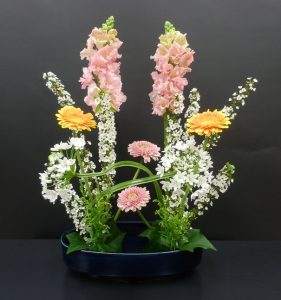Biology and Art - May 2025
Pollinators and Partnerships: Art of Mutualism
Mutualism among species is an essential ecological interaction that promotes survival, resource acquisition, and environmental balance. Clownfish and sea anemones or oxpeckers and zebras form mutualistic relationships. Plants share with fungi, bacteria, and even other plant species. They support each other’s growth and survival, pollination, and seed dispersal. In forests, vines may climb trees to access sunlight. In short, mutualism enhances biodiversity and the smooth functioning of ecosystems. What about us? Are humans involved in mutualism with other species? What do you think?
種間の共生は、生存、資源獲得、環境のバランスを促進する重要な生態学的相互作用です。オックスペッカーとゼブラなどは共生関係を形成しています。植物は菌類、細菌、さらには他の植物種とも共生関係を結んでいます。互いに成長と生存を支え合い、受粉や種子の散布を助けます。森林では、つる植物が日光を得るために木に登ることもあります。共生は生物多様性を高め、生態系の円滑な機能を支えます。では、私たちはどうでしょうか?人間は他の種と共生関係にあるのでしょうか?あなたはどう思いますか?
[HAIKU]
The rules are simple: 5-7-5, there is no seasonal reference word (a kigo), but your poem must relate to either biology or the topic of the month, and you are writing in English.
ルールは簡単。五・七・五、季語はなくてもよいけれど、生物学かその月の話題に関連した句であること、そして英語で詠むことです。
Roots share with mushrooms,
bees dance on blooms for nectar—
both thrive side by side.
根はキノコと、
蜂は花に蜜を求めて舞う—
どちらも共に繁栄する。
[IKEBANA]

WORDS TO LEARN
mutualism - 共生, ecological interaction - 生態学的相互作用, to promote - 促進, resource acquisition - 資源獲得, clownfish - クマノミ, sea anemone - イソギンチャ, fungi - 菌類, bacteria - 細菌, pollination - 受粉, seed dispersal - 種子の散布, to enhance biodiversity - 生物多様性を向上させるため


